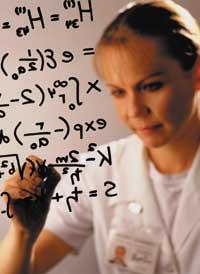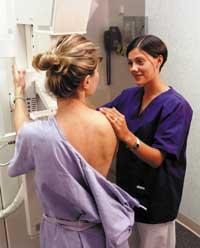Few people on the street of science
The European Union has published the results of the survey that gives continuity to the 'eurobarometer' conducted in 1992. The questionnaire has been extended to all countries of the European Union. A total of 16,029 people over 15 have been consulted, that is, about 1,000 inhabitants per country.
Topics of interest

The results of the survey show that interest in scientific issues is quite high among Europeans, although this interest is not reflected in excess at the level of understanding and knowledge.
The topics that most interest arouse are the closest and most cited by the media: health and the environment. 60.3% of Europeans say they deal with medical advances. The most interested are women (68.4%) and adults (69.5% of those over 55). For young people, the focus is mainly on environmental issues (53.8% from 15 to 24 years).
But it is not enough to have interest, we must understand what is read or heard. The topics that seem best understood are air pollution (85.3%), mad cow disease (76.6%), greenhouse effect (72.9%), ozone layer hole (72.3%) and Earth's warming effect. Topics related to genetically modified organisms and the Internet are understood by 60% and only a third of news about fuel cells, while news about nanotechnology is incomprehensible for 67.1% of Europeans.
It was time for respondents to try that ‘subjective’ idea. They were asked to answer whether the questioning statements on scientific issues were true or false. The result is surprising: 55.7% note that the ozone layer hole causes more storms, while 70% consider that it understands the ozone layer phenomenon. The contradiction is clear.
Expectations and doubts
Europeans believe in the benefits of science and technology, but not as much as before. In addition, they consider that politics and the economy also have influence in the field of science, and have a greater concern for these aspects.

More than half of Europeans think that science and technology will not solve the problem of hunger. 61.3% do not believe “that scientific advances will not exhaust Earth’s natural resources.” On the contrary, 80.5% think that science will help cure diseases as serious as AIDS and cancer.
As for applied research, many of the respondents consider high-tech products to be more complementary than functional. But the Internet, for example, does not enter this level and, above all, does so for new economic activities. Will the internet improve your quality of life? Very few believe this, although among young people this idea is more widespread.
OPINION OF EUROPEAN STUDENTS Science classes are not attractive enough 67.3% Science subjects are too difficult 58.7% Science is not of interest to young people 53.4% Awards are unattractive 40% Science has a pessimistic image 34%Scientific responsibility
Who are the scientists? Powerful men and women for their knowledge. They constitute a special professional category, whose activity generates ethical questions that should be under the control of society. This is the opinion of most Europeans. But common opinion is divided into the definition of the responsibility of researchers in the use of inventions.

The responsibility of scientists focuses on other issues and most Europeans (84.4%) consider that a discovery is not “good” or “bad”, but that the use that is made is the one to be taken into account.
When entering into ethical problems, for example in animal experiments, the answers vary according to the sex and beliefs of each. Most men (50.6%) and 55.4% of those with a right political thought accept these experiments. In women, 59.4% do not see them well.
Most claim that social control is beneficial and that, at the same time, scientists, whenever they respect ethical standards, must be free to continue their research.
But to whom to deal with nearby problems? The most trusted are doctors (71.1%, especially among the elderly), scientists (44.9%) and engineers (29.8%). The least credible are journalists, businessmen and women (about 13%) and politicians (6.6%). Therefore, in the event of a catastrophe in the environment, scientists would first believe.
Understand the doctor's directions Suppose the doctor tells a couple that, depending on the genetic material they contain, the possibility that your child has an inherited disease is one in four. This means:
The correct result was 68.7%. |
Main television in information sources

The main source of information is television. Most of the respondents (66.4%), to report on a scientific issue, prefer to watch the television program rather than read the articles, a fact that occurs in all countries. Among the most studied is the written press, with 41.5% of information through the press and 29.2% of scientific journals. Radio, for its part, is a medium for older people and uses the Internet among young people.
Young people are also closest to science and technology museums (31% of visitors). The older say they have no interest or time and are too far away. These scientific spaces have great success in Holland, Denmark and Sweden.
As for the work of journalists, the majority (53.3%) consider that journalists working on scientific issues do not have sufficient knowledge or training. Regarding the space dedicated to science in the media, 65.8% say that there are not enough articles and television programs on science.
Some of the questions raised in the questionnaire
True or false (percentages are poll results) | EGIA | FALSE | I don't know |
1. Lasers work with sound wave conversion | 26,6 | 35,3 | 38.1 |
2. Antibiotics kill viruses and bacteria | Total | 39.7% | Information |
3. Electrons are smaller than atoms | Total | Services | 35,7 |
4th Father's genes define the sex of the child | 48.1 | 380 | 21.6% |
5. All radioactivity comes from human activity | 26,5 | 5O | 20.9 |
6th Earth turns to the Sun in a month | 22.9 | 56.3 | 20.9 |
7. The first humans lived in the same time as dinosaurs | 20.3 | 59.4 | 20.3 |
8th. Radioactive milk can be healed by boiling | 11,8 | 64.2 | 24 hours |
9. The Sun revolves around the Earth | 26,1 | 66.8 | 7.1 |
10. Humans come from older animal species | 68.6 | 16.6 | 14.8 |
11. The oxygen we breathe comes from plants | 79.7% | 13.6 | 6.7 |
12. Continents move in the last millions of years and will continue to move in the future | 81.8 | Results | 12.7 |
13. The center of the Earth is very hot | 88.4 | 3.5 | 8.1 |
Imagine the work of scientists A scientist tries to find out if a medicine is effective against a disease. There are no prevention, diagnosis or treatment measures for this disease. What is the best way to measure the effectiveness of this medicine?
The correct answer was 36.7%. |
Result: True: 3,4,10,11,12,13; False: 1,2,5,6,7,8,9; Understand the doctor's instructions: 3; Represents the work of scientists: 3.





